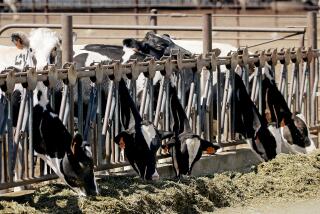Knudsen Misses Payment, May File for Bankruptcy
Knudsen Foods, the largest dairy products company in the West, said Tuesday that it did not have enough money to pay dairy farmers and other suppliers and may file for protection from its creditors under Chapter 11 of the U.S. Bankruptcy Code.
Knudsen, known to generations of Southern Californians for its milk, cottage cheese and yogurt, said it missed an $18-million payment to dairy farmers on Monday.
Knudsen’s announcement triggered a wave of concern through California’s dairy industry, as farmers tried to find other buyers for their milk. Some refused to ship milk to Knudsen and turned away empty Knudsen milk tankers. Stock trading in Knudsen’s parent company, Winn Enterprises, was halted Tuesday on the American Stock Exchange.
Effect on Availability Unclear
It was not clear what effect Knudsen’s problems would have on the availability of milk in Southern California supermarkets. Michael Shultz, the dairy buyer for Hughes supermarkets, a large purchaser of Knudsen milk, said the supermarket chain had received assurances from Knudsen that Hughes would continue to receive its normal supply. “I understand that everything is A-OK for now,” he said.
Glenn Gleason, chief of the milk pooling branch at the state Department of Agriculture, said the department was watching the milk supply situation closely. “We don’t want it to become a situation where there will be a problem getting milk to the consumer,” he said. Knudsen produces about 20% of the state’s milk products, which includes milk, ice cream and cheese.
After all-day meetings with its bankers and suppliers at Citicorp’s downtown offices Tuesday, Ted D. Nelson, chairman of Winn Enterprises, said that Winn’s lenders, led by Citicorp Industrial Credit Bank, agreed to loan Winn enough money to operate the business on a pay-as-you go basis for the next seven days. That amount is believed to be close to $20 million.
The bank also agreed to loan Knudsen $1.8 million to cover 10% of the $18-million payment to farmers that the company failed to make on Monday.
Commenting on the company’s problems, Nelson said, “These latest events are particularly disappointing in light of the progress we’ve made over the last six months.” Although the company has continued to experience severe cash-flow problems, Nelson said, Knudsen’s plants had started to operate smoothly. After its merger with archrival Foremost last June, the company experienced production problems at a number of its plants, which led to late deliveries and a loss of customers.
Winn said it has been experiencing financial problems since last September, when the company disclosed that it was not able to pay some of its debt holders. Winn took on large amounts of debt to buy Knudsen for $74.8 million in 1983 and Foremost Dairies for $50.1 million last year.
In its announcement Tuesday, the company said that “in view of the substantial payments due milk producers and other vendors for past deliveries . . . both Knudsen and Foremost may petition the court” for Chapter 11 protection.
If the company’s problems push it into Chapter 11, it would be protected from its creditors while reorganizing its finances under the supervision of a federal bankruptcy judge.
Nelson said that since its lenders agreed to loan it additional funds, the threat of a bankruptcy filing seems diminished. “I think the bankers and suppliers recognize we’re all in the same canoe,” he said. “If it tips over, we all get wet.”
Meanwhile on Tuesday, some dairy farmers said they would refuse to deliver milk to Knudsen today, preferring to store it at their dairies until Knudsen assures them payment.
Gene Koopman, an Ontario dairy farmer, said that by mid-morning he had stored about 4,400 pounds of milk on his dairy farm that would have normally been bound for Knudsen’s plants. However, he said he was not sure what he would do after his storage tanks are full. He said the issue for producers now is finding a home for the milk.
Ruby Uliana, manager of the Cal-Dari milk cooperative in Modesto, said she has not had any luck in finding another buyer for the cooperative’s milk supply. “There just aren’t that many processors that can take a large amount of milk,” she said. Uliana said Knudsen owes the cooperative $1.2 million.
Nelson, in a telephone interview, said Knudsen was forced to skip its payment to dairy farmers after Citicorp refused to advance Knudsen any more credit. Nelson said he was informed of Citicorp’s decision Monday, after Citicorp rejected several proposals by Knudsen to pay off much of the $150 million Knudsen owes its banks.
Nelson said Knudsen expects to hold a meeting with its bankers and other creditors over the next seven days to devise a plan to pay off the company’s debt, which stood at $266.2 million on Dec. 31, 1985. Those plans are likely to include the sale of some of Winn’s businesses, Nelson said.
Several weeks ago, Winn, which also owns a small Utah savings and loan, announced that all or part of the company was for sale. Nelson said the company is being marketed in five pieces, with the California dairy operations as part of a group that includes Arizona and Nevada. Winn also has dairy properties in Hawaii, Texas, Louisiana, Missouri and Arkansas.
Nelson said “large dairy companies” have expressed interest in buying parts of the company. He also said that a group of Knudsen executives have offered to buy one of the pieces. Other sources said the management group has bid for the Knudsen operations in Texas.
More to Read
Inside the business of entertainment
The Wide Shot brings you news, analysis and insights on everything from streaming wars to production — and what it all means for the future.
You may occasionally receive promotional content from the Los Angeles Times.










